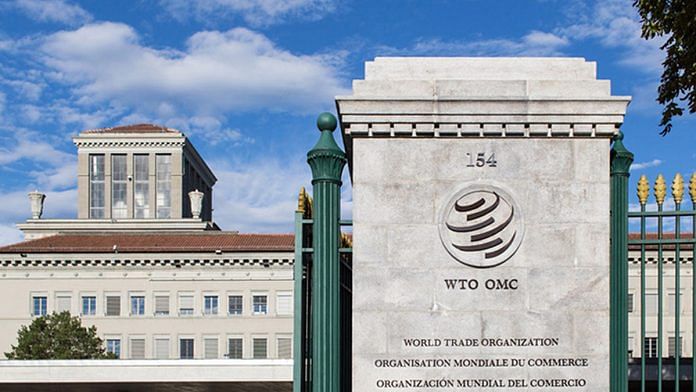When World Trade Organization (WTO) members meet in Geneva in November, they must do more than agree a high-level trade and health declaration. They should take concrete action to eliminate the trade-distorting measures affecting global value chains for the vaccines, therapies, and diagnostics needed to fight the pandemic. Measures such as tariffs and export restrictions continue to create unnecessary costs in these value chains, undermining the COVID-19 response and setting back efforts to extend manufacturing capacity. Ministers should launch new talks to address these trade barriers.
The COVID-19 pandemic hit at a time when bio-manufacturing was undergoing a process of democratization. Technological progress had enabled growing capacity in many countries including Brazil, Indonesia, South Africa, Tunisia, Argentina, and Egypt. By 2020, the business model for bio-manufacturing had fundamentally changed and it was becoming the norm for companies to distribute research, development and manufacturing across geographies and work with partners.
As recently as 15 years ago, building a facility to produce biologics such as monoclonal antibodies or vaccines could require an investment of as much as €500m, and it would take up to 3 years to bring that facility online. New manufacturing technologies have made it cheaper and easier to build new facilities and to scale up existing ones. Today, an investment of €20m can get a bio-manufacturing plant up and running. Such changes are part of the reason the global community was able to launch production of new COVID-19 vaccines so quickly.
The urgency of COVID-19 accelerated further innovations in bio-manufacturing equipment and processes, and compressed production time in a way that will have positive impacts in the future. But the pandemic also revealed major weaknesses in global value chains. It was difficult for manufacturers to keep up with the sudden surge for demand for raw materials and equipment, as many new research and development and manufacturing partnerships rapidly took off. To extend capacity, new employees, intensive training and collaboration, and more infrastructure were needed.
The global community was faced with the reality that facilities cannot be built everywhere in an instant, and that there are bottlenecks in the supply chain. Government action in some cases made things worse. Some countries enacted export restrictions on COVID-related products, which made it extremely difficult to run a global supply chain. Another difficult issue has been the tariffs applied on biologics and the products needed for their manufacture.
Eighteen months into the pandemic, biologics manufacturers are still trying to cope with a range of challenges. There is still surging demand for equipment and raw materials. In some cases, they have expanded manufacturing capacity to produce more equipment such as filters and bioreactors. This continues to require time and significant investments.
Trade policy action is needed to support this effort. The November Ministerial Conference will give WTO members an opportunity to accelerate the COVID response and improve future pandemic preparedness. Recent talks about a package of COVID-related trade measures is a welcome development. While discussions remain in the early stages, action in the areas of tariffs, export restrictions and regulatory coordination could help to remove impediments to the COVID response and future pandemic preparedness.
Tariff elimination
Tariff elimination should be a cornerstone of any agreement. Many countries have had tariffs in place for a long time on the highly diverse set of products that go into bio-manufacturing. Global value chains are the norm today, and tariffs add harmful costs – especially when stacked all along the value chains. These cost increases are often eventually passed on to patients. By negatively affecting the business case for local production, tariffs can set back efforts to establish new research and development and production centers.
WTO members should consider a multilateral approach to tariff elimination, based on the existing Zero for Zero agreement. In fact, extending Zero for Zero product coverage and geographic participation should be a priority in the coming months. Initially, WTO Members could focus on freeing up COVID-related finished products as well as the equipment and other products needed to develop and produce them. To this effect, lists of relevant Harmonized System (HS) codes have already been produced by different actors, including the “joint consultative list” published by the WTO with partners and the list of HS codes published by the Geneva-based Innovation Council, which focuses on inputs for bio-manufacturing.
To generate immediate cost savings along biologics value chains, WTO Members should consider unilateral tariff elimination in the near term. Ultimately, though, tariff elimination should be permanent as well as geographically broad. Only this can create the legal certainty and predictability needed for actors along these global value chains. For countries preparing to engage in bio-manufacturing or intending to scale existing activities in this area, reducing tariffs on bio inputs will be in their own interest.
The human cost of the pandemic, already terrible, continues to grow. Vaccines against COVID were developed through a series of unprecedented partnerships, at an unprecedented speed. But this is not the finish line; there is still an urgent need to extend vaccination globally, including by increasing biologics manufacturing capacity. We urge WTO members to agree to new action by November to address tariffs and other problematic trade measures that could slow these efforts.
This article was previously published in the World Economic Forum.
Also read: Nations with digital skills, epidemic experience managed Covid crisis better — WEF report



